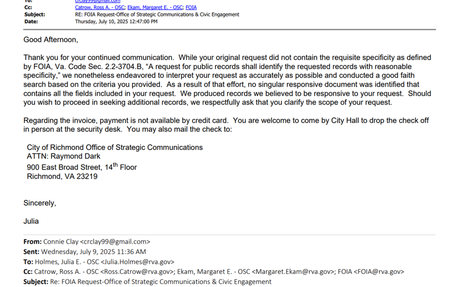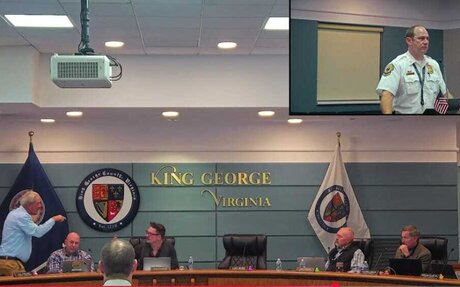|
|
0 8 . 2 2 . 2 5
All Access
8 items
You didn’t miss it. The newsletter has been on hiatus this week.
|
|
|

|
State
At a barbecue restaurant in Hopewell earlier this month, Lt. Gov. Winsome Earle-Sears unveiled her new campaign theme as the Republican nominee for governor. “Operation Defend and Deliver” would defend policy wins of the past four years that she and Gov. Glenn Youngkin had made, she told the audience. But, when asked, her office and campaign have been unable to show what kind of role she has had in Youngkin’s administration. VPM News also filed a FOIA request with the lieutenant governor’s office for her schedule, a record that is required to be maintained and permanently held. In response, the office produced a largely-blank, 297-page PDF that excluded “approximately 297 records,” citing the exemption covering “confidential correspondence and working papers of the Office of the Lieutenant Governor.” “We remain committed to transparency and accountability in government, but must also adhere to statutory provisions in place to safeguard information of a sensitive nature,” the office wrote in the response. The released records also did not include events that Earle-Sears’ office had previously released to the public.
NOTE: The exemption cited is discretionary. They are not required to keep the schedule secret, they are choosing to.
|
|
|

|
Local
Smithfield Town Attorney William Riddick’s law firm has billed Smithfield taxpayers 72% more than the town’s contracted hourly rate for the past 18 months, a Times investigation found. State law requires the Town Council, to whom Riddick directly reports, to set its attorney’s hourly rate. The Times investigation has found no evidence that an increase in the hourly rate was authorized by current or prior town councils. A special meeting of the current council is expected to occur Aug. 21 or Aug. 22, according to Councilman Darren Cutler, who said he and three other members of the council called for the meeting. The town charter allows the mayor or any three members to call a special meeting. Riddick & Pope, PC, billed the town — and was paid — $350 per hour from January 2024 through June of this year instead of the $200 per hour in the town’s 2008 contract, a copy of which Town Manager Michael Stallings provided to the Times and confirmed to be the “most recent.”
|
|
|

|
Local
More than 1,000 documents later, Richmond officials have had enough. In a recent legal filing, attorneys for the city asked a judge to make Connie Clay stop submitting Virginia Freedom of Information Act requests to City Hall. Clay, the city’s former FOIA officer, is suing the city, alleging she was wrongfully terminated in 2024 for refusing to violate public records laws. According to records obtained by The Times-Dispatch, Clay since June has sent 16 FOIA requests to city officials seeking records of travel expenses, training programs, correspondence and disciplinary actions related to Petula Burks, who fired Clay. “(Clay’s) use of FOIA in this manner is a transparent attempt to gain improper insight into the city’s case strategy and secure an unfair tactical advantage,” wrote attorneys for the city in their filing, which was first reported by The Richmonder. “By transmitting these materials to her counsel, (Clay) implicates … the Virginia Rules of Professional Conduct, which prohibits lawyers from using methods of obtaining evidence that violate the legal rights of opposing parties and have no substantial purpose other than to embarrass,” attorneys for the city wrote.
|
|
|

|
Local
An expert on Virginia’s Freedom of Information Act says the Franklin City Council had the choice of discussing City Manager Rosylen Oglesby’s resignation in open session, as two council members advocated. Heather Hays Lockerman, counsel from Sands Anderson who was serving as the city’s attorney at the Aug. 4 meeting, said, “To the extent that there’s any personnel or other confidential issues, they may not be discussed in open session.” But Virginia Coalition for Open Government Executive Director Megan Rhyne said FOIA does not prohibit public bodies from discussing personnel matters in open session. Near the beginning of the Aug. 4 meeting, before the closed session began, Ward 3 Councilman Gregory McLemore sought to make an amendment to the meeting’s agenda, stating, “For practical purposes, I think this meeting should be held in open session as opposed to closed session, because I think the people want to know what this all is regarding.” Ward 6 Councilwoman Jessica G. Banks said, “So if it is public, I’m going to excuse myself, because that sets the city up for a lawsuit.”
|
|
|

|
Local
Charlotteville’s Police Civilian Oversight Board has been gutted. A mass exodus of members that began in the spring has left the board without a quorum to hold votes, and soon the board will have no executive director to lead its operations. It is now the second time in as many years the board has not had enough members to officially hold votes.
|
|
|

|
Local
Tensions between members of the King George Board of Supervisors flared four hours into Tuesday’s meeting. James Monroe district representative T.C. Collins told Chair and Dahlgren representative William Davis to “Go to hell” twice, after Davis asked Collins to stop talking over other board members and to be “polite and courteous” towards staff members. “This isn’t a Senate hearing where you get to interrogate people to death without giving anyone else a chance to do anything,” Davis said to Collins. “This isn’t your time.”
|
|
|

|
Historical records
If you’re a Virginian, there’s a good chance you live in a burned county. That’s the informal term many historians and researchers use to describe the nearly half of Virginia counties (and a handful of cities) that suffered significant losses of official records at some point in the past two-and-a-half centuries or so. The physical records kept at county courthouses — deeds, wills and marriage records, to name a few — permanently illuminate the past and provide a critical link to our ancestors as time inevitably erases human memory. As the retelling of our history becomes more inclusive, and we acknowledge that a broad swath of Americans played a role in who we’ve become today, these records are a permanent wellspring of their stories. One of those remarkable tales involves the salvation of county records so complete that they’ve been recognized by the Virginia House of Delegates.
|
|
|

|
Column
State and local governments have long understood they’d have to adjust to shifting federal priorities under the Trump administration. But many did not recognize they might have to adapt to a world where it’s harder to access crucial data. Recent changes in federal data collection and distribution will make it harder for state and local governments to plan for things like disease outbreaks, disasters, crime prevention, transportation and housing policy, says Brian Castrucci, the president and CEO of the de Beaumont Foundation, a public health nonprofit.
|
|
|
|
|
|
|
|
|